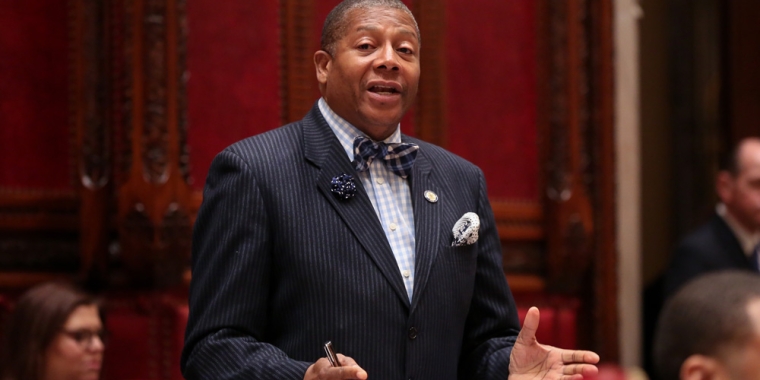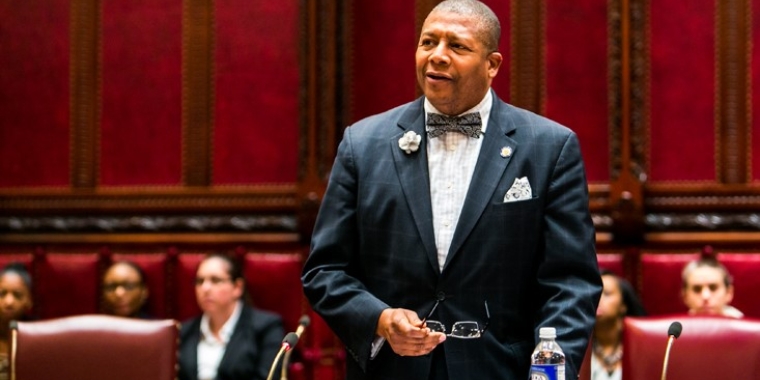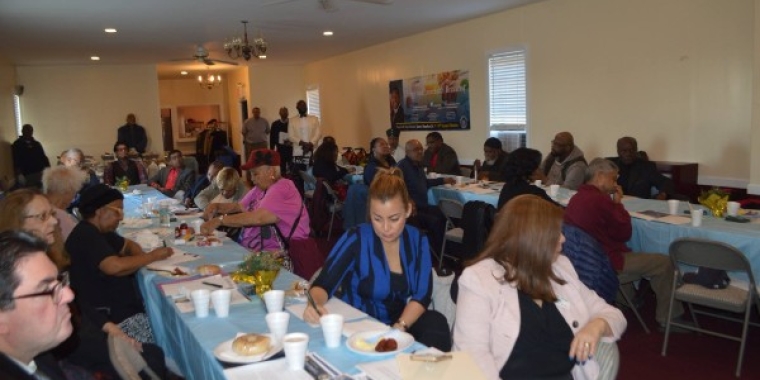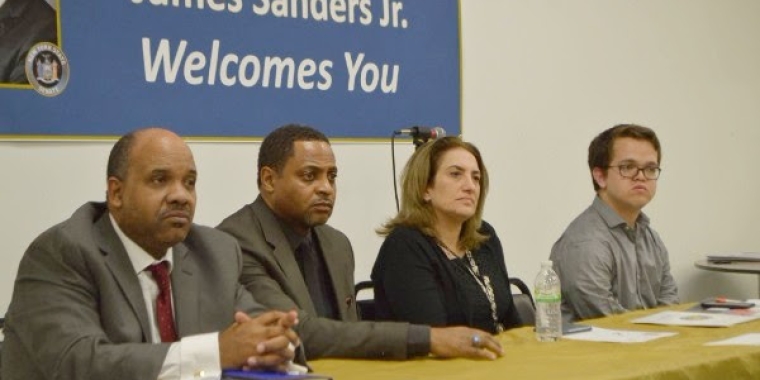
Senator Sanders Says 2020 State Budget Suffers Under the Weight of Coronavirus - Here's a Summary of the Wins, Losses & What Needs Work
April 6, 2020

State Senator James Sanders Jr. (D-Rochdale Village, Far Rockaway) and his Majority Conference colleagues, along with Governor Cuomo, passed a $177 billion budget that he believes has some positive components but unfortunately fails to build upon the progress that was made last year, due to many issues being derailed by the coronavirus pandemic.
"This virus has affected all aspects of society and the legislature is no different," Sanders said. "It has weakened the budget in many ways, but we still took many positive steps forward given the circumstances. This is a situation, under which none of us has had to work before. We were building the plane as we were flying and under those conditions, the results can be classified as satisfactory."
Here is a breakdown of the wins, the losses, and the parts of the budget that still need work:
Wins
COVID-19 Response
The state budget provides much needed emergency relief to help New Yorkers get through the coronavirus pandemic with support for healthcare, struggling families and protection for vital services. This aid includes:
- Paid Quarantine Leave for those exposed to the virus
- Immediate unemployment insurance for workers who lost their job during the pandemic
- Restores Medicaid and hospital funding that was proposed to be cut
- Guaranteed Sick Leave of at least 5-7 days for all employees
- Increased Unemployment Insurance funding by $1.05 billion
- Added $9.8 million to address an anticipated increase in workers compensation claims spurred by COVID-19
- Added almost $3.5 million in statewide and local economic development programs
- Kept MTA subway, bus, and commuter rail services running with access to emergency loans to offset revenue losses and increased costs caused by COVID-19.
- Protected our schools from budget cuts despite a multi-billion dollar state deficit caused by COVID-19
Education
- Providing a $104 million increase in School Aid for a total of $27.9 billion
- Ensuring every school district is held harmless in Foundation Aid and will receive the same amount as in 2019-20 – a total state-wide investment of $18.4 billion.
- Providing a $96 million increase for expense-based aids for a total funding level of $8.99 billion
- Providing $10 million in new funding for student mental health support grants and $1 million for civics curriculum development. Additionally, past years’ competitive grants are maintained, totaling more than $230 million in funding to school districts for programs such as early college high schools, after-school programming, and advanced courses.
Healthcare
● Expanding access to telehealth in the Medicaid program so more New Yorkers can connect with their physical and mental health providers
● Increasing tobacco and vaping control regulations, including prohibiting sale of such products not approved by the FDA, displaying advertisement for such products near a school, increasing the penalty for the sale of tobacco and vape products to minors.
● Designating 13 fentanyl analogs to Schedule I controlled substances to get these drugs off the streets and protect New Yorkers.
● Authorizing the Department of Financial Services to investigate prescription drug price increases of over 50% and indications of fraud.
● Limiting out-of-pocket expenses for a 30 day supply of insulin to be capped at $100.
Mandatory Sick Leave
Every employer is now required to provide its employees with sick leave and the amount of days depends on the size of the employer. An employer with four or less employees must provide its workers with 5 days of unpaid sick leave. Employers with 5 to 99 employees must provide its employees with 5 days of paid sick leave. Employers with 100 or more employees must provide its employees with 7 days of paid sick leave.
Domestic Violence
- Empowers law enforcement to seize weapons for at least 48 hours when responding to domestic violence incidents.
- Law enforcement will be authorized to seize firearms that are in plain view when conducting a lawful search in responding to a domestic violence incident.
- Ensuring information on misdemeanor domestic violence convictions are easier to identify on a criminal record for gun background checks.
Environment
Authorizing the $3 billion ‘Restore Mother Nature Bond Act’ which includes
- $1 billion for restoration and flood risk reduction;
- $700 million for climate change mitigation;
- $550 million for open space land conservation and recreation;
- $550 million for water quality improvement and resilient infrastructure; and
- Specific provisions for projects benefiting environmental justice communities
Banning styrofoam food packaging and packaging peanuts beginning January 1, 2022.
Economic Development
- Extending the application period for START-UP NY for five years to December 2025.
- The enacted budget provides an additional $4,714,000 for statewide and local economic development programs.
- Extending the Excelsior Tax Credit Program for 5 years.
- Making the New York Buy American Act permanent.
- Providing an additional $365,000 Minority and Women-Owned Business Development.
Veterans
- Providing funds for programs that help connect veterans with peers, address PTSD, and transition back to civilian life.
- Extending the ‘Hire-a-Vet’ tax credit to help incentivize New York businesses to provide good paying jobs for returning veterans.
Transportation
- Committing $3 billion to the MTA's 2020-24 Capital Plan.
- Providing the State Department of Transportation with $6 billion in capital funds to help ensure vital investments are made to the state’s transportation system.
- Allocating funds for extreme winter recovery road reconstruction to keep these roads functional so New Yorkers can continue traveling safely.
LOSSES
Education and Medicaid Uncertainty
The budget gives the Governor the authority to adjust spending when it come to education, Medicaid and other important areas in order fill in the $15 billion deficit which the state incurred as a result coronavirus pandemic.
Loss of Revenue
Given the current emergency, the state is anticipated to have a reduction in tax revenue of $10 billion. The plan is to depend on federal aid, short-term loans and cuts as well as reserves. Provisions to make the wealthy pay their fair share were not included.
State Budget Director Unfettered Authority
In various parts of the budget, there was language that granted the State Budget Director the sole discretion to make budget adjustments at various times of the year. Those adjustments included withholding some or all appropriations based on certain economic conditions of the state or whether to fund certain programs, provided such funding would not compromise the State’s overall financial plan. In certain instances, the director’s determination can made be without consulting the Legislature. Such unfettered authority arguably would jeopardize the checks and balances between the legislative and executive branches.
"DRAW" - Enacted Budget Provisions That Need Work
Criminal Justice
Bail reform, which was implemented last year, and eliminated bail for defendants charged with non-violent offenses and misdemeanors, has been modified under the new budget. The new law gives a judge discretion to decide whether to impose cash bail for defendants accused of more serious offenses like crimes which cause the death of another, sex trafficking, criminal possession of a weapon on school grounds, grand larceny and other crimes as well as for repeat offenders.
Trusted Traveler Program
If you recall, earlier this year President Trump suspended New York’s use of the Trusted Traveler Program (TTP) because the Green Light Law, which passed last year restricted the DMV from sharing information with the Department of Homeland Security. The Governor in this budget amended the restriction language to allow the DMV to share records and information it maintains “for acceptance into a trusted traveler program or to facilitate vehicle imports and exports.”
Prevailing Wages
The budget included language which states that any private construction projects which receives public subsidies must pay their workers prevailing wages. However, if the total unemployment rate in the state exceeds 5% during any month in the 12 months period prior to July 1, 2021, this act will not take effect.
Share this Article or Press Release
Newsroom
Go to Newsroom
Sanders Against Trump Changes to Community Reinvestment Act
January 12, 2018


